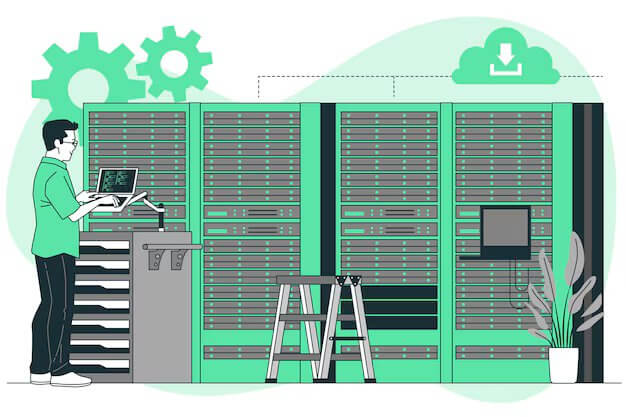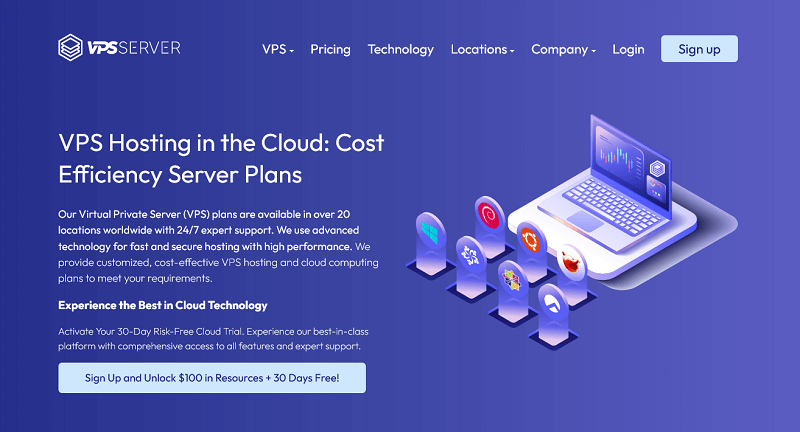VPS Infrastructure

The Virtual Private Server infrastructure marks a significant evolution in web hosting services. This technology effectively narrows the divide between the cost-effectiveness of shared hosting and the solid performance of dedicated servers, offering an optimal mix of affordability, efficiency, and scalability.
As companies expand and their online needs grow, the demand for enhanced control and improved performance becomes essential. VPS meets this demand by dividing an entire physical server into several virtual ones. Each of these operates autonomously, with its operating system providing functionalities comparable to those of a dedicated hosting.
VPS uses virtualization technology to assign specific resources from a single physical server to multiple users. This arrangement not only boosts performance but also increases security and control over the server environment. It enables businesses to reach peak performance levels economically without the need to lease an entire physical server.

VPS hosting is particularly beneficial for web hosting developers, medium-sized companies, and giant corporations that need to install custom software, manage servers effectively, and scale server resources according to demand. Each VPS is a discrete entity equipped with its own CPU, RAM, and storage space, which guarantees that applications perform reliably and efficiently.
In the upcoming sections, we will explore more about Virtual Private Server infrastructure, including its extensive advantages and the unique features that make it a favored option for various hosting needs.
Understanding Virtual Private Server Infrastructure
Virtual Private Server infrastructure introduces a method of maximizing the efficiency and accessibility of VPS web hosting services for businesses of all sizes. By segmenting a physical server into multiple separate servers, each functioning with autonomous computing capabilities and resources, VPS provides a sandboxed environment.
This setup mimics the exclusivity of dedicated hosting while maintaining the economic footprint of shared hosting. The architecture of VPS allows for enhanced resource allocation, which is critical for applications requiring stable and high-performance computing conditions.

The strategic deployment of VPS hosting can significantly alter the way businesses deploy and manage their online presence. With a dedicated set of resources, users experience consistent performance levels, immune to the surges in traffic or resource demands that might affect other tenants on the same physical server.
Moreover, the ability to customize the operating system environment to precise specifications empowers businesses to optimize their applications and services without the constraints typically imposed by shared hosting frameworks.
Now, we explore the key features and benefits of Virtual Private Server infrastructure, with the goal of enhancing your comprehension of its operations and the tactical advantages it provides to users.
What is Virtual Private Server Infrastructure?

A Virtual Private Server employs virtualization technology to allocate specific resources to individual users on a shared physical server.
This hosting method is both more secure and stable than shared hosting, where exclusive server space is not reserved for individual users. It is also more cost-effective than renting an entire server. Essentially, a VPS functions like a dedicated server but within a communal server setting.
Virtual Private Server infrastructure segments a single physical server into multiple independent servers. Each virtual server, or "container," operates independently on the physical server and has its own operating system, storage, and bandwidth.
This division enables server administrators to install tailored operating systems and applications, customizing the hosting environment to meet specific requirements.
The Benefits of VPS Hosting

VPS is positioned advantageously across both shared and dedicated hosting settings and, as a result, brings valuable operations to the table. On the one hand, it is as cost-effective as shared hosting, while on the other, it preserves many of the powerful features of dedicated servers. Such a combination enables users to work with dedicated resources, deploy backed-up security features, and switch all operations easily to a larger server when the time comes. From running a small blog to starting a fully-fledged e-commerce platform, VPS hosting can serve your needs cost-efficiently.
Affordable Hosting Option
VPS hosting is the most cost-effective hosting available to the three as it is the middle ground when it comes to pricing. VPS hosting is most favorable toward small- to medium-sized businesses acquiring more resources than they are capable of obtaining from shared hosting while using dedicated servers proves to be too expensive. The pay-as-you-go model ensures that businesses pay for the only resources they use while on the service. Scaling businesses' resources up or down is also possible at the same time, and businesses are only charged for the resources they consume at that time.
Moreover, VPS hosting typically includes a suite of tools and services that enhance value. Businesses can benefit from features like automatic backups, advanced monitoring capabilities, and robust security measures that are often included without the hefty price tag of dedicated hosting solutions. This blend of affordability and utility makes VPS hosting a compelling choice for businesses looking to maximize their budget while maintaining a high level of service and server autonomy.
Flexibility
Indeed, the flexibility of VPS hosting is one of its main strengths. With it, you can quickly and easily customize the operating environment as you see fit for your business. This is especially beneficial to companies that use proprietary software or platforms that need server configurations shared by hosting providers that they do not use. For example, developers may select their OS manage server settings and install software specific to their project without being restricted to shared hosting providers’ allocations.
This level of flexibility extends to security and performance settings, enabling businesses to implement custom firewall configurations and optimize server performance for their applications. Whether it's setting up a development environment or hosting a high-traffic database-driven site, VPS hosting provides the necessary tools and freedom to customize and configure the server as if it were a dedicated resource, all while keeping costs manageable.
Expandability
VPS hosting is inherently scalable and designed to support the dynamic needs of growing businesses. As your website or application grows, you can seamlessly increase server resources such as RAM, CPU power, and disk space. This scalability ensures that your hosting environment evolves in tandem with your operational demands, providing a buffer against performance degradation and system overloads that could otherwise impact user experience and business operations.
Moreover, due to its scalable nature, users do not need to overcommit resources for future growth immediately. This ensures that businesses utilize their financial and computing resources wisely and are billed only when they need them. Hence, consumers can upsize and downsize their resources as their needs change in real-time.
Autonomy
VPS hosting provides an elevated level of autonomy by granting users root access to the server. This access allows for complete control over the server environment, from software installations to security configurations tailored to meet specific business requirements. Such autonomy is crucial for businesses that need to implement strict compliance standards or require a customized stack of applications to run their operations effectively.
Furthermore, the option for managed services in a VPS environment adds a layer of convenience and expertise. Businesses can outsource some basic maintenance activities, such as software updates, security patches, and hardware server management, to the hosting provider. This managed approach helps not only maintain the highest uptime, allowing businesses to focus more on their core operations; it leaves the other technicals in the hands of the expert.

Control and Flexibility
VPS hosting provides root access, enabling complete control over your applications and system configurations. Many VPS hosting providers also offer managed VPS services that include system updates and application server management, which helps reduce administrative overhead.
Enhanced Site Performance:
VPS hosting is aimed at helping you optimize your website's functionality. In shared hosting, server resources are shared among a few users. On the other hand, resources are specific to your website when hosting VPS. This exclusive resource allocation ensures reliability and high performance in times of entire traffic; hence, your website remains accessible and functional throughout.
Further advancing the performance advantage of VPS hosting, there's potential for tweaking server settings according to your site's requirements; this can include setting up the caching mechanism, fine-tuning the database management system, or setting the proper resource limits for top performance. That type of focused optimization increases your site's speed and responsiveness, delivering quality user experiences and helping boost your SEO.
How do VPS Servers Work?

Virtual Private Servers (VPS) are pivotal in contemporary web hosting. They merge the advantages of shared and dedicated hosting within a robust technological framework. This distinct configuration offers businesses and individuals a versatile, scalable, and economically viable hosting solution. Unlike shared hosting, which distributes resources randomly across a communal server, VPS hosting creates an individual server-like experience.
Each VPS operates independently within the same physical server, offering improved security, performance, and management control. Virtualization technology, which divides a single physical server into several separate virtual servers, underpins the functionality of a VPS.
Each virtual server can operate its operating system and applications independently, akin to a separate physical server. A software layer facilitates this division called the hypervisor, which either resides directly on the hardware or a host operating system. It manages the virtual servers by distributing resources such as CPU cores, RAM, and storage individually to each VPS.
This setup guarantees that each VPS server has access to dedicated resources, mitigating the resource variability seen in shared hosting environments. For instance, high traffic on one VPS does not compromise the performance of other virtual servers housed on the same physical server.
Moreover, VPS environments usually provide root access to the VPS server, enabling users to install bespoke software and configure settings precisely, thus customizing their hosting environment to meet specific requirements.
VPS Resources

Selecting the appropriate VPS resources is akin to assembling a custom PC. Your website's demands, including complexity and traffic volume, dictate the needed resources. A robust VPS can process more data, offer faster response times, and sustain a reliable user experience.
Similarly, a high-performance gaming PC is crucial for optimal gaming; a busy e-commerce site needs a powerful VPS to handle intricate tasks efficiently. Considering this, a balance of affordability and functionality has to be struck so that your VPS of choice suffices with time.
CPU
The central processing unit will execute your software server commands. In a VPS environment, CPU capabilities are spread across multiple virtual cores allocated to different virtual servers. The quantity and speed of these cores play a pivotal role in how quickly your VPS server can process tasks.
Increasing the number of CPU cores improves the server’s ability to handle multiple tasks at once, which is essential for sites with high traffic or complex applications. Optimizing your CPU configuration is vital for efficient VPS operation, affecting everything from simple website activities to resource-intensive applications.
RAM
Random Access Memory serves as the immediate storage area for your server’s data needs. When processing a request, the VPS temporarily uses RAM to store data for swift access. The available RAM significantly affects the server's ability to handle active tasks and user interactions.
Due to insufficient RAM, your system may fail to respond promptly or even at all, resulting in errors like "500 Internal Server Error." It is, therefore, essential that your VPS has enough RAM to help you run the tasks optimally without potentially ruining the user experience and website functionality.

Storage space
Storage—this is the amount of space that will be needed to store all your content on the website: HTML files, databases, e-mails, and multimedia files; thus, this becomes a vital criterion for the selection of VPS that can meet both present and future storage needs.
Today, many VPS plans offer SSDs (solid-state drives) in place of traditional HDDs (Hard disk drives), as they ensure fast data access and promise improved server performance. Proper storage planning is paramount in avoiding the emerging challenges related to data migration or server downtime.
Bandwidth
This question is very general and would not elicit an appropriate response from a user. If somebody were to ask me about bandwidth, I would generally say that it's an amount of data that. The amount of bandwidth required solely depends on the amount of traffic that is expected to transverse the website.
Secondly, it is also based on the kind of content to be hosted. For example, a video and high-resolution image site will usually require much more bandwidth than more straightforward, text-only pages. The estimation of bandwidth requirements for standard and peak traffic periods should be done perfectly so that, if at all, there is data transfer; otherwise, the user experiences remain fluent.
It is also essential to know any limitations on bandwidth and associated costs to prevent a surprise overage from disrupting service.
Features of VPSServer Infrastructure
VPSServer infrastructure, with its unique blend of reliability, performance, and global presence, stands out in the competitive landscape of VPS hosting providers. This section explores the intricate details that make it a top choice for small—to medium-sized enterprises with significant web traffic and international operations. By understanding these unique features, potential users and businesses can make informed decisions when choosing their VPS web hosting provider.

VPSServer specs
VPSServer infrastructure is a cost-effective yet robust solution, ideal for small to medium-sized enterprises dealing with significant web traffic. Each virtual machine operates independently on a single physical server, retaining dedicated resources for security and control. This configuration, similar to a dedicated server's environment, provides high security and resource control at a more affordable price point, making it a practical choice for businesses with limited resources.
The technical backbone of VPSServer is built on high-end hardware configurations, featuring 2.7 GHz Intel Xeon Skylake processors and utilizing NVMe SSDs for storage. This ensures top-tier performance and minimal latency across its data centers worldwide. The adoption of KVM virtualization technology secures and isolates each virtual machine. At the same time, unlimited IOPS capabilities support businesses' demanding performance needs, instilling confidence in the system's ability to handle high traffic.
Moreover, VPSServer's infrastructure is designed to support rapid scaling of traffic, making it a robust solution for growing businesses. The integration of cutting-edge technology with round-the-clock expert support renders VPSServer a prime choice for organizations that need reliable, high-performance, dedicated hosting environments. This combination of dedicated and cloud-based hosting features offers a scalable, secure, and cost-effective solution for maintaining an impactful online presence.
20+ VPSServer locations
VPSServer's extensive global presence is a testament to its commitment to cater to businesses with international operations. With over 20 strategic locations across the globe, businesses can select the optimal spot for the lowest possible latency, thereby optimizing the performance of their hosted applications.
This extensive network setup is particularly beneficial for users whose operations demand rapid data exchange, such as financial traders and large-scale web hosting service providers. It assures you that your international operations will be well-supported.
Network latency—the delay before a transfer of data begins following an instruction for its transfer—is a critical factor in a server's performance. VPSServer's multiple locations allow for proximity to major economic centers such as London, Frankfurt, and New York, which is particularly beneficial for trading markets. By situating servers near these hubs, VPSServer minimizes latency, which is crucial for high-speed trading that relies on fast order execution.
Geo-location also plays a significant role in server selection. For businesses targeting specific regional markets, choosing a server location close to their customer base can drastically improve response times and overall user experience. For instance, a European company would benefit from servers in London or Frankfurt to cater to local customers while leveraging locations like New York to serve American markets.
This proximity not only enhances performance but can also boost SEO rankings by reducing load times for the majority of users. Additionally, VPSServer's global reach ensures that businesses can maintain optimal performance across international markets, further supported by robust CDN solutions to manage more significant distributions and traffic loads.
By providing a variety of server locations coupled with high-tech server configurations, VPSServer infrastructure offers a versatile and effective solution for businesses looking to optimize their web hosting service presence globally.
What is a VPS Used For?
A Virtual Private Server (VPS) simulates a physical server within a virtual environment, offering a versatile platform that caters to a wide range of users—from individual developers to large organizations. Users can install multiple operating systems, manage large websites, and customize applications to meet specific needs. Additionally, a VPS can adeptly manage intricate activities such as operating software programs, streaming content, or offering a safeguarded area for sensitive transactions, proving vital for users needing more authority and functionality than what shared hosting environments offer.
VPS technology also excels in handling sophisticated and intensive operations like analyzing vast data sets, executing machine learning algorithms, or functioning as a test area for experimenting with new software or security updates. This capability is particularly beneficial for tech experts who require a manageable yet scalable setting to test, deploy, and fine-tune applications without the financial and logistical burdens of physical servers.
Hosting Websites
Hosting websites on a VPS offers several advantages over traditional hosting. It allows for personalized allocation of server resources tailored specifically to a website's needs, enhancing both performance and security. This customization is crucial for sites requiring unique software setups or those undergoing rapid growth, necessitating swift resource adjustments to sustain optimal performance. Moreover, the compartmentalized nature of a VPS ensures that a website does not share resources with others, enhancing both security and performance, which is especially critical for e-commerce sites where data security and uptime are vital.
For site administrators, a VPS offers improved performance, security, and, importantly, scalability. As site traffic increases, a VPS can seamlessly scale to match the demand, ensuring that resources like CPU, memory, and storage are always sufficient, thus avoiding downtime or slow performance during peak traffic times, which is essential for user satisfaction and SEO.
Hosting Web and Mobile Applications
Developers of web and mobile applications find fully managed VPS hosting particularly beneficial. This service provides essential resources and grants control over the hosting environment, which is crucial for effectively managing complex applications. The flexibility to modify resources as needed allows developers to enhance their applications' responsiveness and user experience, which is crucial in competitive app markets.
The secure and isolated nature of a VPS is essential for maintaining application integrity, particularly for apps that process sensitive or financial data. This environment enables developers to extensively test and implement security measures before going live, thus minimizing vulnerabilities and increasing security. The privacy VPS offers is also critical for proprietary or experimental projects requiring confidentiality during the development and testing phases.
Setting Up a Gaming Server
Gamers can use a VPS to set up private servers, gaining complete control over their online multiplayer environments. This setup allows for customization of server rules, game modifications, and latency adjustments, directly impacting the quality and optimized gaming experience. The ability to tailor the server environment ensures a personalized gaming experience that meets the specific needs of a community, from modifying difficulty levels to adding custom maps or managing administrative rights.
Other benefits of gaming with a VPS include improved connectivity and lower lag times, whereas in competitive gaming, literally each thousandth of a second counts. VPS hosting provides a firm and secure basis by completely erasing all the complications that are common in shared or public servers, most usually including overloads, unexpected downtimes, or, of course, security breaches.
Setting Up an Email Server
Hosting an email server on a VPS is strategic for organizations that prioritize secure and controlled communication systems. Managing their email servers allows businesses to implement tailored security measures, create specific spam filters, and ensure encryption of all communications, significantly enhancing data protection against cyber threats. This setup also facilitates the integration of custom email management tools and other corporate systems, streamlining workflows and boosting productivity.
Moreover, a dedicated VPS for email services helps organizations avoid the drawbacks of shared email hosting, which is crucial for businesses with high email volumes or those in regulated industries. By hosting their servers, companies can ensure compliance with data protection laws and have complete control over data management policies, which is essential for maintaining confidentiality and trust in corporate communications.

Hosting a VPN
A VPS can be effectively transformed into a VPN server, offering a secure pathway for internet access, which is especially beneficial for businesses with remote work policies or those who frequently handle sensitive data. This setup not only helps in masking IP addresses but also encrypts data transfers, safeguarding information from potential interception during transmission. The versatility of a VPS as a VPN extends to its capability to bypass geographical restrictions and network limitations, which is invaluable for companies with international operations or those requiring access to region-specific content.
A VPS also offers enhanced network server management and scalability, enabling businesses to provide secure access to more users without substantial infrastructure investments. This is advantageous for expanding companies needing to uphold strong security measures as they grow. Additionally, the control a VPS offers allows for optimization of VPN performance and reliability, ensuring continuous and secure access to network resources.
Serving as a Testbed
IT professionals and developers often use VPS technology as a testbed for software development and testing. This isolated setup ensures that experiments, modifications, or updates do not affect the live production environment, preventing disruptions and potential data loss. The adaptability of a VPS allows for easy resource adjustment to suit specific testing needs, whether it involves expanding storage for data-heavy tests or boosting CPU performance for application trials.
Utilizing a VPS as a testbed for software development helps minimize the risks of deploying software that may not be thoroughly tested or stable. This setup allows companies to thoroughly test new applications, updates, or configurations in a controlled environment, ensuring that only well-tested and optimized solutions go live. This is vital for maintaining system reliability, enhancing user satisfaction, and ensuring operational effectiveness.
Setting Up a Backup Server
A database server installed on a VPS further improves the performance and scalability of data-centric applications and websites. Running the database operations on one VPS ensures that the database has enough resources to respond to large numbers of queries and transactions without bringing other server operations to a halt.
It's essential for this segregation in applications that require high availability and speed of the database - like e-commerce sites, platforms with real-time analytics, or systems for customer relationship management. Other benefits that come along with using a VPS as a database server include good performance and enhanced security features for sensitive data from getting into the wrong hands and unauthorized breaches through the use of sophisticated access controls and encryption techniques.
This is critical in maintaining consumer trust and adhering to data protection regulations. Besides, a VPS's flexibility allows it to adapt easily to ever-changing data demands. A VPS server best suits businesses bound to grow and must use data.
Setting Up a Database Server
For websites and applications that require extensive database use, setting up a database server on a VPS can improve performance. With dedicated resources, databases can run more efficiently, handling more significant queries and higher volumes of data without the performance bottlenecks typically associated with shared hosting.
Key Differences Between VPS and Other Hosting Solutions
What really counts is the proper choice of hosting solution to ensure maximum performance and functionality for your site. In general, there are three types: shared, VPS, and dedicated hosting. Each of these options offers a different level of resources, performance, and control, all suitable for specific website needs and business goals.
| Feature | Shared Hosting | VPS Hosting | Dedicated Hosting |
|---|---|---|---|
| Resource Allocation | Shared resources (CPU, RAM, storage, bandwidth) among all sites on the server. | Dedicated resources allocated to each VPS within the same server. | Complete allocation of all server resources to a single client. |
| Cost | Most cost-effective option, suitable for small websites with low traffic. | More expensive than shared hosting but cheaper than dedicated hosting. Provides good value for growing sites. | Most expensive option, suited for high-traffic sites and large businesses requiring extensive resources. |
| Performance | Can be affected by other websites on the same server. Less reliable during traffic surges. | Better and more consistent performance than shared hosting due to isolated environments. | Best performance with dedicated resources ensuring optimal operation without interference from other sites. |
| Security | Least secure due to resource sharing. Vulnerable to "bad neighbor" effects. | More secure through isolation. Users can implement extensive security measures like firewalls and custom security software. | Most secure, as clients control the entire server environment. Ideal for handling sensitive transactions. |
| Control and Customization | Limited control over server environment and software installations. | Root access allows for complete customization and control over software and settings. | Full root and admin access, allowing for total customization and control, necessary for specific applications and compliance needs. |
| Scalability | Limited scalability; upgrading often means moving to a VPS or dedicated server. | Easily scalable within the hosting provider's infrastructure. Upgrades are usually seamless and instant. | Scalability involves physical upgrades or server migrations, which can be complex and time-consuming. |
| Management Complexity | Low; mostly managed by hosting providers. Suitable for beginners and small businesses. | Moderate; offers managed and unmanaged plans depending on the user's technical expertise. | High; requires technical expertise to manage and optimize server performance effectively. |
VPS hosting vs. shared hosting
VPS hosting and shared hosting are fundamentally distinct in their approaches. The critical difference lies in how they distribute server resources among users. VPS hosting providers, unlike shared hosting environments, provide distinct isolation and specific resource allocation, making VPS a more solid and secure choice for hosting your website.
Shared Hosting: In this configuration, several users utilize the resources from a single physical server. This arrangement makes shared hosting affordable but also introduces notable challenges. For instance, issues on one website, like a spike in traffic or a security breach, could affect all sites on the same server in a shared hosting setup.
This communal resource environment can lead to compromised security and performance, posing risks to website stability. Moreover, customization options are limited in shared hosting, which can obstruct the installation of specific software or settings. This setup may not suit websites with high traffic volumes or complex operational demands.
VPS Hosting: Unlike shared hosting, a Virtual Private Server provides allocated portions of the server's resources, like CPU cores, memory, and storage, exclusively to each user. This structure significantly boosts performance by preventing other websites on the server from affecting your resources and enhances security.
Each VPS operates independently, ensuring that issues on one server do not compromise another. Managed VPS hosting provides users with root access, enabling deeper customization options like software installations, firewall setups, and other security enhancements. It ensures that you are only responsible for the performance and reliability of your server, independent of any disruptions by other users.

VPS hosting vs. dedicated server
VPS Hosting and Dedicated Hosting provide a high level of performance and control, offering an array of features to address distinct requirements and plans humanely.
Dedicated Hosting: This model entails renting an entire server to a single user. It provides the highest degree of resource distribution, security, and server management. Users of dedicated hosting have entire root and admin access, allowing them to configure the server precisely to their needs, whether for managing high traffic levels, extensive database requirements, or complex applications. However, dedicated hosting is typically more expensive than VPS and requires more technical skills to manage. Additionally, upgrading a dedicated hosting can take time and effort. This process can often require physical hardware updates or transferring to a more potent server, actions that may lead to operational delays and possible technical issues.
VPS Hosting: A Virtual Private Server offers more than affordability compared to dedicated hosting; it's also highly scalable. It mimics the control and capabilities of dedicated hosting but operates within a shared hosting environment. The real benefit is the ease of upgrading—a process that can usually be completed quickly via a few clicks on a server management dashboard.
This flexibility means that as your website expands, you can seamlessly scale up resources without needing to modify physical hardware. Virtual servers are supported by clusters of physical nodes, which provide considerable capacity for expansion. Should the need arise for more resources, the hosting provider can integrate additional nodes into the cluster, ensuring that your VPS can grow effectively and efficiently. With managed VPS hosting, you're well-prepared to handle your website's ongoing development.
Shared hosting is appropriate for smaller websites with minimal traffic. In contrast, VPS serves as an ideal compromise for those seeking enhanced performance and control without the expense associated with a dedicated server. Dedicated hosting is the optimal choice for websites experiencing high traffic volumes or for large enterprises needing complete server control.
Remember, the selection of hosting services is in your hands and should align with your business's unique demands and resources. This empowers you to make the best decision for your website.
Frequently Asked Questions
What is a Virtual Private Server?
In simple terms, a Virtual Private Server is a hosting model that uses virtualization technology to partition one physical server into many virtual servers with private and dedicated resources. This setting provides a cheap cost balance with the best performance, similar to dedicated hosting.
What are the main benefits of VPS hosting?
The essential benefits of a VPS hosting plan encompass saving on cost, resources that can scale up or down, enhanced VPS server performance, and access with root that provides users with complete control over their environments and the applications that are installed.
How does VPS hosting differ from shared hosting and dedicated hosting?
It isolates every user within its separate environment with dedicated server resources, keeping at bay any disruptions from activities carried out by other users. In most cases, this provides a cheaper and easier solution for scaling than a dedicated server on which you have to make physical changes.
To whom would VPS be a wise choice?
This VPS hosting plan is suitable for medium businesses, web developers, and other big corporate houses that wish to install their required custom software and manage resources efficiently and flexibly without the cost involved with a dedicated server.
What types of tasks are suitable for a VPS?
VPS is so flexible that it can support numerous uses, such as web hosting, application development, game server creation, private email system administration, VPNs, and database maintenance.
How can VPS hosting improve the performance of your website?
VPS hosting solutions guarantee resources are made available to each user, including the CPU, RAM, and storage, to ensure the sites offer consistent and stable performance without regard to demand and activity effects on others who share the same physical server.
What does VPS hosting offer me in terms of customization possibilities?
VPS hosting plans offer total flexibility with operating systems and let users install bespoke applications, allowing them to customize their server setup according to their requirements.
How does VPS hosting enhance security compared to shared hosting?
This is because VPS hosting significantly reduces most of the security risks that are very common with shared hosting setups. This kind of hosting, through its isolated environments, leads to dedicated resources that help enhance control over a server's security settings.
How does VPS hosting enhance security compared to shared hosting?
VPS hosting bolsters security by allocating separate environments to each user, effectively reducing the likelihood of disruptions and security issues that often occur in shared hosting environments where users share resources.
What should be considered when choosing resources like CPU, RAM, and storage for managed VPS hosting?
When deciding on managed VPS hosting resources, it's vital to assess your website's complexity, expected traffic, and specific operational demands. This evaluation helps ensure your server is equipped with adequate processing power, memory, and storage to handle your requirements efficiently.













